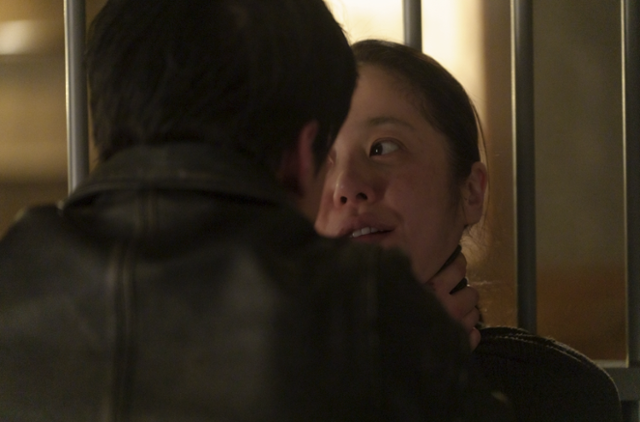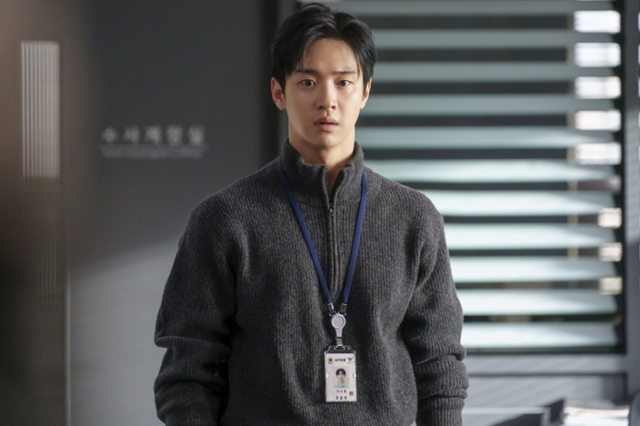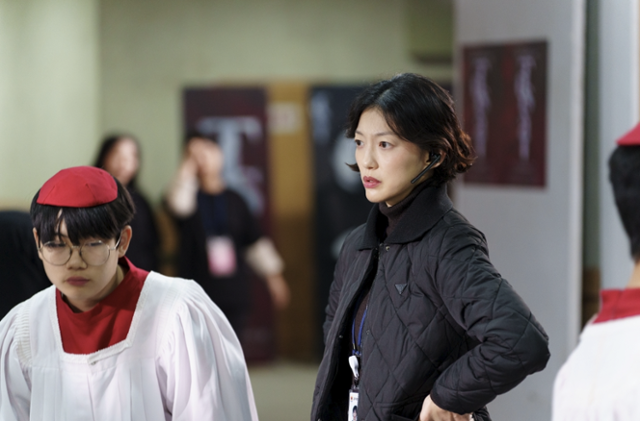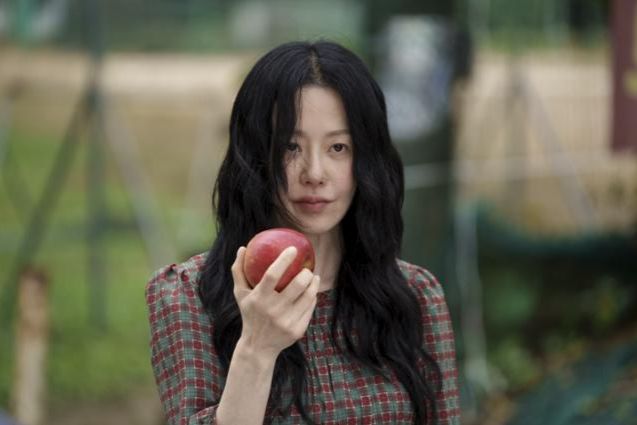Go Hyun-jung’s chilling transformation into a serial killer mother has seized viewers’ attention. The SBS drama “Queen Mantis” follows Jung I-shin, a notorious murderer who brutally killed men who targeted women and children. After 23 years behind bars, she is released to help investigate a copycat case — and to reunite with her estranged son, detective Cha Su-yeol (Jang Dong-yoon).
Despite the polarizing nature of the crime thriller genre, the response has exceeded expectations. The series reached a nationwide rating of 7.5 percent with its fourth episode, becoming the top Friday-Saturday drama, and climbed to No. 1 on Netflix Korea. I-shin’s contradictory nature — seemingly loving and longing for her son while also tormenting and using him — is portrayed with powerful charisma, fueling the show’s intense tension.
With just two episodes left before the finale, Hankook Ilbo’s culture desk reporters take a closer look at the disturbing and complex relationship between mother and son.

A scene from “Queen Mantis” / Courtesy of SBS
Kwon Young-eun: Why did Jung I-shin volunteer to cooperate with the investigation? Even as a psychopathic killer, I think she was driven by a strong desire to see her son again after so many years.
Kang Yu-bin: She is far from ordinary, but she is not completely devoid of maternal love. She shows no guilt over her murders, but I believe she feels regret for not being there for her young son and for turning him into the “son of a murderer.” The first condition she set when confessing was to protect her son. In the scene where she first meets Su-yeol and calls him by his birth name, “Jung-ho,” her hands tremble and her eyes waver.
Song Ok-jin: On the other hand, didn’t the son also feel curious about his mother? After hearing that I-shin once changed their identities to protect him, Su-yeol visits her with her favorite Yirgacheffe coffee. He becomes furious and disappointed when he hears of her escape. Deep down, he holds onto hopes like “Maybe my mother isn’t entirely evil” or “She does love me.” Parent-child relationships are often built on both love and hate. This drama amplifies that dynamic by portraying them as a detective and a ruthless criminal.
Kwon: Su-yeol seems anxious that he might become like the mother he’s hated all his life. That fear is also why he refuses to have a child. Jang Dong-yoon’s portrayal of Su-yeol — someone so obsessed with “living righteously” that he probably never littered — contrasts sharply with scenes of emotional turmoil, where his acting feels slightly stiff. The scene where he confesses to his wife, “I’m scared of myself. Do I like the smell of blood? Do I want to shoot people legally?” is especially disappointing.

A scene from “Queen Mantis” / Courtesy of SBS
Kang: Go Hyun-jung’s performance, however, is unmatched. “When a saw cuts through the neck bones from side to side, the torso vibrates. Drrrr, drrrr.” The way she describes her brutal killing method so casually, closing her eyes and feeling pleasure, is pure psychopathic. It instantly freezes the atmosphere, reminding viewers of the show’s thriller nature. The tension is vastly different in scenes with and without her.
Song: A female psychopathic serial killer is something we have rarely seen before, which feels refreshing. At the same time, the fact that she kills as a form of resistance against male violence feels like a repetition of familiar tropes. Before her first murder, I-shin is portrayed as a warm mother who even cares for a neglected neighbor’s child, but she suddenly turns into someone who enjoys killing — a transformation that lacks convincing motivation. Perhaps the remaining episodes will reveal more of her backstory.
Kang: Su-yeol believes that I-shin kills simply because she enjoys it. “She chooses people who have done something wrong, just to justify killing them,” he says. Up to episode six, the show seems to deliberately blur the line between I-shin’s true self and the real reason for her release.

A scene from “Queen Mantis” / Courtesy of SBS
Kwon: I-shin’s presence is so strong that it overshadows other major characters. The rest of the cast feels dull and frustrating by comparison. The subplot about ace investigator Kim Na-hee’s divorce, for example, feels unnecessary. Her impulsive reaction — grabbing a key suspect by the collar and inadvertently helping his escape — seems unrealistic for a seasoned detective.
Song: The investigation itself has many flaws. The police’s lack of skill is so obvious that it becomes distracting. Why did it take them so long to find a victim trapped inside a hospital laundry machine? With so many security cameras between the abduction site and the hospital, how could they fail to track the route? Most importantly, the show’s main premise is that I-shin is helping the investigation — but we still don’t know what she’s actually done to help.

Director Byun Young-joo, actors Jang Dong-yoon, Lee El, and Jo Sung-ha greet the audience during an outdoor stage greeting for “Queen Mantis” at the 30th Busan International Film Festival in Haeundae District, Sept. 21. Yonhap
Kwon: Director Byun Young-joo is known for speaking out on human rights issues. In episode six, when transgender character Eddie explains gender-affirming surgery in detail, I was reminded, “Ah, this is a Byun Young-joo production.” The series is unusually short for a terrestrial TV miniseries, with only eight episodes, but the pacing still feels sluggish rather than tight and concise. Shorter, seasonal dramas are a smart strategy for today’s audiences, but “Queen Mantis” doesn’t quite make it work.
Kang: With fewer viewers watching live broadcasts and rising production costs, TV dramas are increasingly adopting OTT-style formats to fit platforms like Netflix.
Song: The trend toward shorter, more provocative dramas is inevitable. To capture viewers in the short-form era, stories need to be more intense and fast-paced. It’s unfortunate that slower, subtler dramas — like a bowl of plain Pyongyang cold noodles — are losing their place.
This article from the Hankook Ilbo, the sister publication of The Korea Times, is translated by a generative AI system and edited by The Korea Times.

